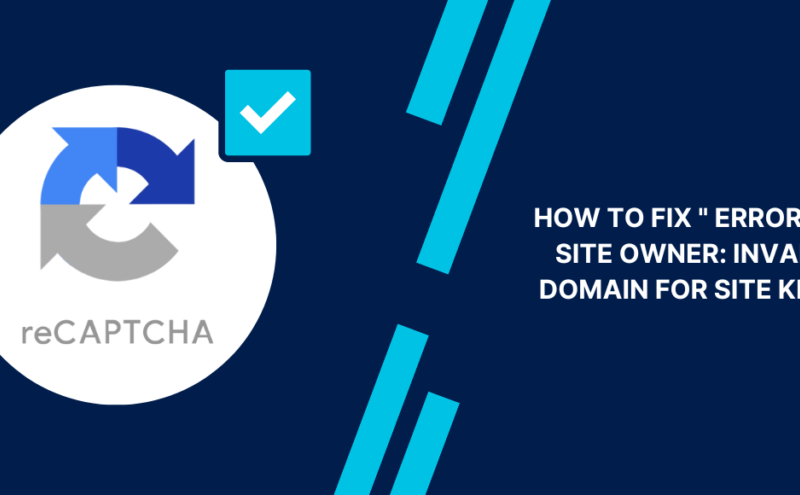Introduction
Have you ever seen the frustrating message “Error for site owner: Invalid domain for site key” while working with Google reCAPTCHA? Don’t worry—you’re not alone. This error can be confusing, but it’s one of the most common issues developers encounter when implementing Google’s security tool.
In this guide, we’ll break down what this error means, why it happens, and how you can fix it quickly—without tearing your hair out.
What Is reCAPTCHA?
reCAPTCHA is a free service from Google that helps protect websites from spam and abuse. It ensures that interactions on your site are from real humans, not bots trying to exploit forms or comment sections.
Originally, reCAPTCHA started as a project to digitize old books by asking users to solve word puzzles. Today, it’s an advanced AI-based tool that runs quietly in the background—verifying human users without requiring them to check any boxes or solve puzzles (especially with reCAPTCHA v3).
How reCAPTCHA Works
Every reCAPTCHA setup uses two essential components: a site key and a secret key.
- The site key is used in your HTML code—it identifies your website to Google.
- The secret key is used server-side to verify the user’s response.
When a visitor interacts with your site, reCAPTCHA sends the verification request to Google. If everything matches—your domain, keys, and settings—the verification succeeds. Otherwise, you get errors like the one we’re discussing.
Meaning of “Invalid Domain for Site Key”
This message means your reCAPTCHA site key is not authorized for the domain where it’s being used. Google reCAPTCHA validates the domain name making the request. If that domain doesn’t match what’s listed in your reCAPTCHA console settings, Google blocks it.
Think of it like trying to use your home Wi-Fi password at your neighbor’s house—it won’t work because it’s not authorized for that network.
Main Causes of the Error
1. Incorrect Domain Configuration
If your domain isn’t added correctly to the reCAPTCHA settings, Google can’t verify it.
2. Unauthorized Domain Usage
If someone copies your site code or you migrate to a new domain without updating reCAPTCHA, it will fail.
3. Domain Migration or Subdomain Issues
Switching from “example.com” to “www.example.com” or adding subdomains can trigger this error.
4. Typographical Errors
Even a small typo—like missing “https://” or an extra slash—can break your reCAPTCHA setup.
How to Identify the Problem
To diagnose the issue:
- Open your website in Chrome.
- Press F12 to open Developer Tools.
- Check the Console tab for reCAPTCHA errors.
You’ll likely see something like:
ERROR for site owner: Invalid domain for site key
Now, you know it’s a domain mismatch problem.
Step-by-Step Fix: Invalid Domain for Site Key
Step 1: Log In to Google reCAPTCHA Console
Go to Google reCAPTCHA Admin Console.
Step 2: Check Domain Settings
Locate your registered site and open its settings. Look under the “Domains” section.
Step 3: Add the Correct Domain
Type your domain name exactly as it appears in your browser (without “https://”). For example:
✅ Correct: example.com
❌ Incorrect: https://example.com
Step 4: Update Website Integration
Replace the old site key in your HTML or plugin settings with the correct one from your console.
Step 5: Clear Cache and Test Again
If you’re using WordPress or a caching plugin, clear all caches before testing the fix.
How to Add or Edit Authorized Domains
- Go to your reCAPTCHA project.
- Click Settings → Edit domains.
- Add your domain and save.
If you’re using multiple subdomains (like shop.example.com and blog.example.com), just add the root domain example.com. Google automatically covers all subdomains.
Common Mistakes Developers Make
- Copying and pasting reCAPTCHA keys between different projects.
- Using an old version key (v2 key with v3 API).
- Forgetting to update domain names after moving from staging to production.
Always double-check your key version and domain spelling before deployment.
Troubleshooting with Examples
Example 1: WordPress Site
If you’re using a plugin like Contact Form 7 or WPForms, go to plugin settings → reCAPTCHA tab, and replace the keys with your updated ones.
Example 2: Custom-Coded Site
If your website uses custom HTML/JavaScript, replace the <script> tag with the correct data-sitekey value.
Error on Localhost Development
When testing reCAPTCHA on localhost, Google blocks it unless you explicitly add localhost as an authorized domain in your reCAPTCHA console.
Simply add localhost to the domain list, and the error will disappear during local testing.
How to Prevent Future reCAPTCHA Errors
- Keep your domain list updated every time you change URLs.
- If you have multiple environments (staging, production), register them all.
- Set reminders to check your reCAPTCHA dashboard periodically for issues.
Alternatives to Google reCAPTCHA
If you’re tired of configuration headaches, try these:
- hCaptcha – Privacy-friendly alternative with similar functionality.
- Cloudflare Turnstile – No annoying puzzles, fully privacy-compliant.
- Friendly Captcha – Lightweight, GDPR-friendly, and easy to integrate.
Best Practices for Implementing reCAPTCHA
- Keep your scripts updated to the latest version.
- Use asynchronous loading to speed up your page.
- Combine with other anti-spam measures like email validation.
- Always ensure accessibility for screen readers.
Conclusion
The “Error for site owner: Invalid domain for site key” might seem intimidating at first, but it’s usually an easy fix. It simply means your domain isn’t properly registered with Google’s reCAPTCHA service. By double-checking your settings and ensuring your keys match your domain, you can restore functionality in minutes.
Protecting your website from spam and bots is essential—and now, you know exactly how to do it right!
FAQs
1. What causes “Invalid domain for site key”?
It’s caused when your reCAPTCHA key is used on a domain not listed in your Google reCAPTCHA settings.
2. How can I fix it on WordPress?
Update your reCAPTCHA keys in the plugin settings and make sure your domain matches exactly with the one registered in Google’s console.
3. Can I use one reCAPTCHA key for multiple websites?
Yes, but only if all those domains are added in the same reCAPTCHA project settings.
4. Does reCAPTCHA work on localhost?
Yes, but you must add localhost as an allowed domain in your project settings.
5. What’s the best alternative to reCAPTCHA?
Cloudflare Turnstile and hCaptcha are excellent alternatives that provide similar security with less friction.





